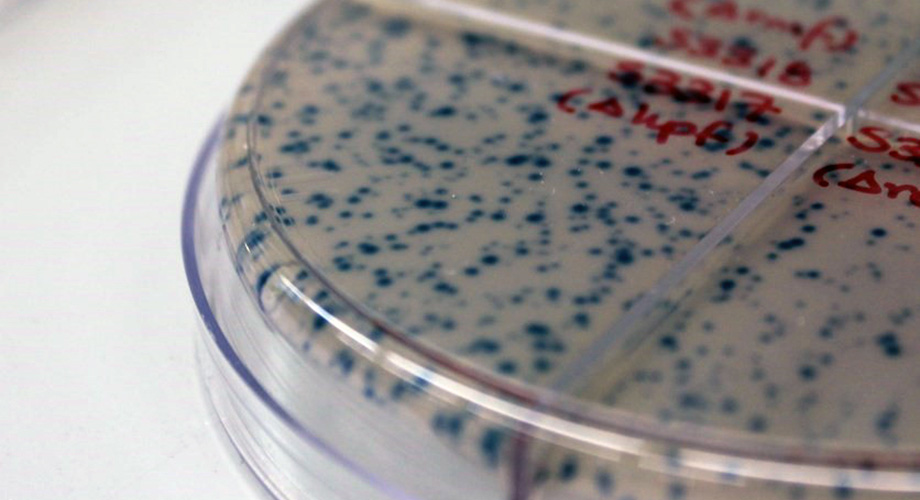
Microbes that have undergone directed evolution to improve production of desired proteins grow in a dish in the lab of Ahmed Badran, PhD.
Revving the ribosome
Researchers use directed evolution technique to speed up protein production in cells.
September 27, 2021
LA JOLLA, CA—Scientists at Scripps Research have used directed-evolution techniques to speed up the workings of protein-making factories in cells called ribosomes. The achievement is a basic scientific one that illuminates a fundamental mechanism in all living things, but it may also lead to the development of more efficient, and perhaps less-costly ways of producing protein-based pharmaceuticals.
The scientists, whose study published Sept. 24 in Nature Communications, mutated common bacterial ribosomes so that they synthesized proteins at much higher rates, and found only modest increases in error rates—and no increase in bacterial growth rates.
“In principle, an approach such as this could allow manufacturers to make protein-based drugs in acceptable quantities with smaller culturing setups,” says Ahmed Badran, PhD, an assistant professor in the Department of Chemistry at Scripps Research. Badran and his laboratory moved to Scripps Research earlier this year from the Broad Institute of MIT and Harvard, where most of the new study was conducted.
Badran is an expert on directed-evolution techniques, in which researchers create mutations in DNA or RNA and, in a highly iterative process that roughly simulates natural evolution, select for mutations that have a particular desired effect.
In this case, he and his team applied directed evolution techniques to ribosomes, the tiny molecular machines that translate genetic information into proteins within the cells of all organisms.
Reflecting their key role in connecting the worlds of nucleic acids and proteins, ribosomes are themselves made of RNA and proteins. In the study, the scientists specifically mutated the large RNA molecules that make up most of bacterial ribosomes. They did this for several well-known bacterial species including Escherichia coli—a common bacterium that inhabits humans and other animals and is also widely used in the biomanufacturing of protein therapeutics.
Although ribosomes presumably have had their protein-synthesis rates optimized by natural evolution, the directed evolution process soon yielded mutants that—in the researchers’ experimental context—could translate proteins three to ten times faster than anyone has reported before.
The researchers also found that the specific mutations that arose in the directed evolution process to enable this speed boost in one bacterial species could often be copied into other bacterial species to speed up their ribosomes too.
Curiously, while the scientists expected that faster synthesis would degrade the accuracy, or “fidelity,” of translation from gene to protein, they found only modest fidelity losses.
“When we compared speed versus fidelity, we found a trend towards reduced fidelity with more speed, but it wasn’t a strong relationship. This suggests that we may be able to develop variants of these ribosomal RNAs that can translate at higher efficiency alongside good fidelity,” Badran says.
Another unexpected finding had to do with growth rates. Biologists have widely assumed that for a given organism, especially a simpler organism such as a bacterium, the ribosomal protein-synthesis rate is a major—or the major—determinant of the organism’s overall growth rate. However, Badran and his team found that greatly boosting the protein synthesis rates of ribosomes from E. coli and other bacteria did not enhance these bacteria’s growth rates.
“The ribosome is integrated into a vast signaling network within the cell—a network that seems to limit overall growth even when the ribosome itself is working faster,” Badran says.
He and his team are continuing this line of research in an effort to push protein-synthesis speeds higher with sufficient or even better fidelity.
In addition to Badran, “Directed evolution of rRNA improves translation kinetics and recombinant protein yield,” was co-authored by first authors Fan Liu and Siniša Bratulić, of the Broad Institute at the time of the study, and by Alan Costello, now at Scripps Research, and Teemu Miettinen of the Massachusetts Institute of Technology.
The research was supported by the National Institutes of Health (DP5-OD-024590), the NASA Exobiology Program (NNH17ZDA001N-EXO), and the Broad Institute of MIT and Harvard.
For more information, contact press@scripps.edu

